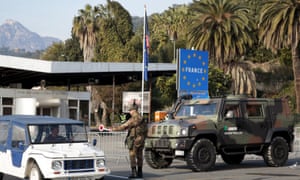January as slow as molasses? You read about my busy January in my previous post; here's an account of yesterday evening, in my cabbie husband's words.
"Just as I was relaxing for the evening, the tablet rings out a fare. I was the nearest free cab within a 15km radius. When someone needs a taxi in winter this far away from the centre of town, it's usually because they need to go to the hospital. But the pick-up point for this fare was outside a supermarket. That's a bit suspect: if you do your shopping at a village supermarket, you must be within walking distance of the supermarket.
When I arrived, I saw a man standing outside the supermarket (the only one in A_________) with a heap of bags sitting next to him on the ground. He was also carrying a bottle... of ouzo... which was open... and half-full. All I could think of that moment was FUCK. I put all his bags into the boot of the car. He sat in the front next to me. He didn't stop talking, not one moment. He was barely intelligible; I couldn't understand what he was talking about. All he had on his hands was the half-filled bottle. I suspected that he had paid for the goods he bought at the supermarket. But no one can really know what is in a drunk's pocket.
"So, we're going home, are we?" I asked him, hoping that the ride would be as short as possible. Somewhere amidst the gibberish he was spieling off, I heard the name of another village: M_______. That's just seven kilometres away from the south coast of Crete, an hour away from where we were at that moment. This was going to be a very long night. I put on the metre, not justfor the reason that I should be on the right side of the law, but because I wanted to see how much the metre would clock up so I can at least talk about the fare the next day at the rank. Being able to tell a story out of it may be my only trophy for the evening.
I suddenly remembered who this man was. He was a pensioner, having held some high-level public service job. I had picked him up once before, in a similar drunken state, again in the same village of A_______ and he had asked me to take him to the other side of the island. I took him to the town centre and dropped him off at the taxi rank, with the excuse that I had run out of petrol. He's well known among the cabbies. Some will take him round in circles (as long as they know his pockets are full). This is not my idea of work. At that moment, all I could think of was my warm house, the armchair and the TV.
"M______? Are you sure that's where you want to go? It's a bit far, isn't it?" He said that he was going to see his friend V_______ who ran the cafe there.
"Don't you want to go home first and drop off your shopping?" I suggested, but he was adamant that he didn't want to go home. Had I known where he lived, I would have taken him there immediately. I was in two minds to turn for the town centre or to take the road to the south coast. I set off for the town centre. "No, not that way!" he shouted. In his drunken state of mind, he was still able to see the road. I was stuck with him. I had just cleaned the cab that morning, so I opened the window on his side so he could vomit if he needed to; from the north of the island, the journey to the south involves climbing up and down mountains.
I've driven to the south coast many times over the course of my life as a cabbie. A faraway fare is a cabbie's joy. But in the middle of winter, it is one of the most desolate experiences you will ever have. The villages in the province of Hania are small, so small that they now have very few inhabitants, nearly all of whom are old and go to bed early. We were leaving the last inhabited village on the way to the south coast. There were hardly any lights on in the houses we passed. They were either uninhabited, holiday homes at best, or the residents had gone to bed. Street lighting is poor. During the whole journey, the man didn't stop talking, occasionally taking a swig of ouzo form the bottle he was carrying. The smell of his alcoholism shielded me from the smell of his body odour. This man was in his own world at that moment.
When we finally reached M______, I asked him where his friend lived. He said he didn't know. I headed for the village square. There was a kafeneio in the village, near the church. Thankfully, it had a light on, and I could see someone inside. I helped my fare out of the car, locked it and headed towards the kafeneio with him. As soon as we entered, I noticed the look of horror on the young owner's face. While my fare continued speaking in his unintelligible gibberish, I asked the cafe owner where we might find V_______.
"V________'s my father," the man said, speaking in whispers. "He's been dead for three years." FUCK. My fare continued to call out to V_________. The cafe owner asked me to take him away. A baby was heard crying in a cot, and a toddler was playing on a mat, overlooked by a young woman who spoke Greek with an accent. If a young man wants to stay in his village, he needs to marry a teenager and bog her down with childcare responsibilities right from the word go, or he needs to import a foreign wife. The woman was fair, short and slim - she was probably Albanian.
"OK, G______ (he had told me his name), let's go home and drop off that shopping, shall we?" I tried to coax my fare back into the cab. At this point, the metre had already written up 75 euro.
"Home?" he looked at me with a wry smile. "I'm not ready to go home now! Take me to the town. I'm a great dancer! Did you know that? I am the best χορευτή in all of Crete! Let's go and listen to a λυρατζή, and I'll show you how good a dancer I am!"
I've been driving a cab for nearly 40 years. It's given me enough time to develop various people skills, one of which is the role of psycho-analyst. As we headed back to the village of A________, I worked out roughly where he lived. I was able to take him to his house. "No," he said, "I'm going to the town, remember?"
"OK, G______, let's drop off the shopping first, so I can take a driving break, is that OK?" Luckily he agreed. I helped him out of the car once again (because I was really worried he might damage it, or throw up in it), and got him to the door of his house, a large 60s style village home built next to an olive grove, which he probably owned. He fumbled around for his keys, but he managed to open the door by himself. I would have done that for him too, but you never know when a drunk might wake up from his slumber. They are used to being robbed or attacked, and may recognise the signs of an imminent one, like he did when he realised I was taking him in another direction.
I brought in his shopping - he had done a lot of it, 10 carrier bags full. The outside of the house did not give any sign of what you would find inside it. It was nothing less than a τρώγλη. Εverything was in disarray, the house was filthy. It was obvious that he lived alone, without any family. I wondered how long ago someone other than himself had entered his house. I may have been his first visitor for the year.
When we had finished carrying the shopping, he asked me how much the fare cost, to my surprise, and partial relief. I showed him the meter: it had written up €140 at that point. "Oh, I've only got €100 on me at the moment," he said. I told him that would be OK. "No!" he insisted. "I have to pay you in full. Take me to an ATM." There was one in the village, so I took him there. He handed me the fare immediately. "Now let's hit the town!" he said. I'll show you what a good dancer I am!"
Again, I had no choice, but to take him into town. I dropped him off at a kafeneio where I could hear Cretan music playing. "how much do I owe you up to here?" he asked me. "Nothing," I said, you paid me earlier, remember?" I just wanted to get rid of him at that point. "No, I didn't! You're still working!" So I asked him for €10. I didn't want anything other than to get away from him at that stage. "You're coming in to see me dance, aren't you?" he asked me, imploringly. "Of course I am," I lied. "Just let me park the car."
What a night. But it wasn't over. As I was driving back home, I picked up another fare about three minutes away from my home. What's there to lose, I thought, I may as well go for the bonus prize. I arrive outside the house and a young woman enters the car. There was something unusual about her face. But it was dark, and I couldn't see her very well. I asked her where we were heading, thinking I'd picked up a typical winter's evening fare (town centre or hospital).
"S__________", she said.
"S________? That's a bit far for this time of night, don't you think?" S______ was just two or so kilometres from A________ where I'd picked up the drunk.
"It's my husband's village," she said.
"Oh, going home then?" I inquired, building up a picture of my fare. "No, we're separated. I'm from D______, in the H______ region. I live here now, and I'm going to pick up my son from his father's." I had picked her up from the middle of the road between her ex-husband's and her own village origins. She was in a bad state: I could now see that half her face was swollen. She told me that her husband had insisted on taking the child with him to show her what a good father he is because he wanted to help raise it, even though they were no longer together. She had advised him not to because the child was ill and he could wait until the child was better, but he didn't heed her advice. He had just called her to tell her that the child was unwell and he couldn't look after it. She said he'd left him because he beat her up. I wanted to ask her what a nice girl like herself was doing with a jerk like him, but I could tell what the answer would be: something like 'he was never violent when we were getting to know each other'. He was probably a good dancer too. Girls from small villages fall for that kind easily; it's a way of leaving your village - and ending up at another one.
When I arrived at the house, I realised who her ex was: his drunk brother had blown out his brains at a wedding when he insisted that his gun wasn't loaded. "See, look, it's empty," he said, pointing it to his head. The dead man's brother came out of the house as soon as he heard the taxi drive by. He looked as though he had not shaved or changed his clothes for a year. The woman paid me. I thanked her and was just about to leave when I decided to ask her one more thing: "How will you get home tonight?" She said that her ex will probably give her a lift. I wondered if she would actually return home that night, or end up staying overnight at her ex's. I left, turning off the tablet, as I did not want another fare that night."
We all listened incredulously, as my husband related his evening's exploits. I'd phoned him once to ask him if he could pick up one of the children from the after-school activities, so I knew what was going on. I also called him twice to make sure he was OK. He called me after he picked up the second fare. I keep reminding myself that it's winter, and Greeks hate living through the darkness alone. Everything will be better in the summer, won't it? But not for everyone. Some of us live in perpetual crisis, while others live off other people's crises. (When he got home, he got a call from another cab driver who wanted to know if the drunk guy had any money to pay him for a ride out to the other side of the island. My husband said he had no idea.)
©All Rights Reserved/Organically cooked. No part of this blog may be reproduced and/or copied by any means without prior consent from Maria Verivaki.





























